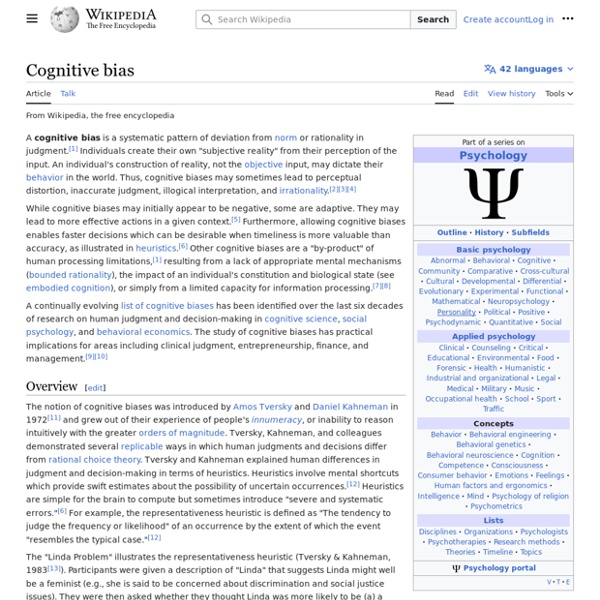IP blocked
What Is a Cognitive Bias?
When we are making judgments and decisions about the world around us, we like to think that we are objective, logical, and capable of taking in and evaluating all the information that is available to us. The reality is, however, that our judgments and decisions are often riddled with errors and influenced by a wide variety of biases. The human brain is both remarkable and powerful, but certainly subject to limitations. One type of fundamental limitation on human thinking is known as a cognitive bias. A cognitive bias is a type of error in thinking that occurs when people are processing and interpreting information in the world around them. Cognitive biases can be caused by a number of different things. These biases are not necessarily all bad, however. Cognitive Bias vs. People sometimes confuse cognitive biases with logical fallacies, but the two are not the same. A Few Types of Cognitive Biases More Psychology Definitions: The Psychology Dictionary Browse the Psychology Dictionary
Cognition
Cognition is a faculty for the processing of information, applying knowledge, and changing preferences. Cognition, or cognitive processes, can be natural or artificial, conscious or unconscious.[4] These processes are analyzed from different perspectives within different contexts, notably in the fields of linguistics, anesthesia, neuroscience, psychiatry, psychology, philosophy, anthropology, systemics, and computer science.[5][page needed] Within psychology or philosophy, the concept of cognition is closely related to abstract concepts such as mind, intelligence. It encompasses the mental functions, mental processes (thoughts), and states of intelligent entities (humans, collaborative groups, human organizations, highly autonomous machines, and artificial intelligences).[3] Etymology[edit] Origins[edit] Wilhelm Wundt (1832-1920) heavily emphasized the notion of what he called introspection; examining the inner feelings of an individual. Psychology[edit] Social process[edit] Serial position
Non-Verbal Communication - Research Paper
Why are the skills of non-verbal communication important especially today? A newspaper article written by Rachael Langford (2006) states 60 to 80 percent of communication is non-verbal (Langford 2006). I work to use third person only when writing formal research papers have concluded that non-verbal communication is important in many ways. One reason is that we use the non-verbal communication in our daily lives without thinking twice about what we are doing. Being aware of non-verbal communication is the first step to understanding others better. The way our voice fluctuates, our dress, and our facial expressions are all ways that humans stereotype and can lead to miscommunication. The book Communication no need to actually mention the book.
Inductive bias
From Wikipedia, the free encyclopedia Assumptions for inference in machine learning The inductive bias (also known as learning bias) of a learning algorithm is the set of assumptions that the learner uses to predict outputs of given inputs that it has not encountered.[1] Inductive bias is anything which makes the algorithm learn one pattern instead of another pattern (e.g., step-functions in decision trees instead of continuous functions in linear regression models). Learning involves searching a space of solutions for a solution that provides a good explanation of the data. In machine learning, the aim is to construct algorithms that are able to learn to predict a certain target output. A classical example of an inductive bias is Occam's razor, assuming that the simplest consistent hypothesis about the target function is actually the best. Approaches to a more formal definition of inductive bias are based on mathematical logic.
IP blocked
List of cognitive biases
In psychology and cognitive science, cognitive biases are systematic patterns of deviation from norm and/or rationality in judgment.[1][2] They are often studied in psychology, sociology and behavioral economics.[1] A memory bias is a cognitive bias that either enhances or impairs the recall of a memory (either the chances that the memory will be recalled at all, or the amount of time it takes for it to be recalled, or both), or that alters the content of a reported memory. Explanations include information-processing rules (i.e., mental shortcuts), called heuristics, that the brain uses to produce decisions or judgments. Biases have a variety of forms and appear as cognitive ("cold") bias, such as mental noise,[3] or motivational ("hot") bias, such as when beliefs are distorted by wishful thinking. Both effects can be present at the same time.[4][5] Although this research overwhelmingly involves human subjects, some studies have found bias in non-human animals as well. [edit] Association:
Neuroscience, free will and determinism: 'I'm just a machine'
What does this mean in terms of free will? "We don't have free will, in the spiritual sense. What you're seeing is the last output stage of a machine. There are lots of things that happen before this stage – plans, goals, learning – and those are the reasons we do more interesting things than just waggle fingers. But there's no ghost in the machine." The conclusions are shocking: if we are part of the universe, and obey its laws, it's hard to see where free will comes into it. "If you see a light go green, it may mean press the accelerator; but there are lots of situations where it doesn't mean that: if the car in front hasn't moved, for example. Slowly, however, we are learning more about the details of that complexity. "What happens if someone commits a crime, and it turns out that there's a lesion in that brain area? This runs shockingly contrary to the sense of freedom that we feel in terms of controlling our actions, on which we base our whole sense of self and system of morality.



